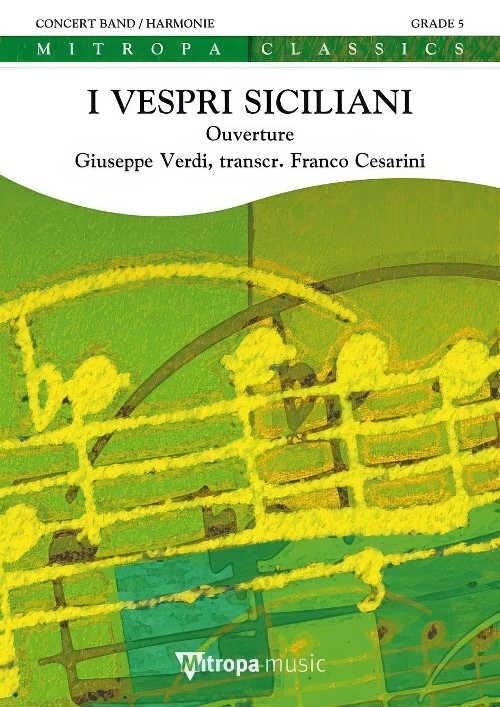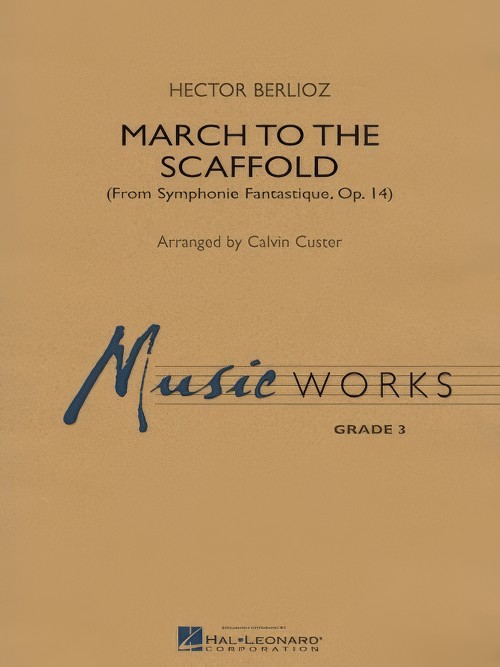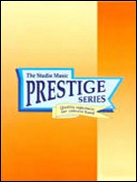Results
-
 £139.99
£139.99I Vespri Siciliani (Concert Band - Score and Parts) - Verdi, Giuseppe - Cesarini, Franco
In 1854, Verdi was in Paris to compose I vespri siciliani (1855), a commission from the Theatre of the Opera. The composer soon became intolerant to the requests of the French "Grand Opra" as he considered them too restrictive and cunning. "I'll be very happy when I have finished I vespri siciliani. An opera at the Opra is as tiring as killing a bull. Five hours of music?... Hauf!" Verdi declared. Following the first performance, the French composer Hector Berlioz wrote in the "Journal des Dbats" an article that read "We have to admit that in I vespri siciliani, the penetrating intensity of the melodic expression, the sumptuous variety of the instrumentation, the fullness, the poetical sonority of the whole, the warm vivacity that shines everywhere and the passionate strength, although slow in disclosing (a characteristic feature of Verdi's talent), give the entire work a mark of greatness, a sort of majestic sovereignty more underlined than in Verdi's previous theatre productions."Duration: 8:30
Estimated dispatch 7-14 working days
-
 £72.99
£72.99March to the Scaffold (from Symphonie Fantastique) (Concert Band - Score and Parts) - Berlioz, Hector - Custer, Calvin
From Berlioz's 'Symphonie Fantasique,' Calvin Custer has carefully captured the picturesque drama of the original orchestral work. Opening with a solemn procession that quickly transforms into a brilliant march, the piece continues to build in intensity up to the final closing chords. A dynamic transcription for intermediate bands.
Estimated dispatch 7-14 working days
-
 £179.99
£179.99Benvenuto Cellini Wind Band Set (Score & Parts)
Hector Berlioz was known for his innovative and creative musical gestures. He composed the opera Benvenuto Cellini in 1838, based on the fascinating life of a 16th century Italian goldsmith of the same name. Unfortunately the work as a whole never gained much popularity however its colourful and exciting overture has, on the other hand, become a firm favourite. Tohru Takahashi has created a stunning concert band arrangement of this well-known overture. 0:11:40
Estimated dispatch 7-14 working days
-
 £214.95
£214.95BLACK FIRE (after Paradise Lost) (Violin Solo with Concert Band - Score and Parts) - Clarke, Nigel
This is not a straight forward concerto, but rather a symphonic drama for violin and ensemble. It uses the soloist as both protagonist and ensemble player, much as Berlioz treated the viola in his symphony 'Harold in Italy'. Black Fire is written in one movement though it has three clear sections (slow, fast and slow). The music reflects the various shades of darkness and suffering that dominate the atmosphere of the early part of the poem. The violinist takes the role of Satan, reflecting his moods, from righteous indignation to sorrowful remorse. A motif from Wagner's opera 'Gotterdaemmerung' (Twighlight of the Gods) is used throughout the work to represent Satan's brooding hatred. At the end of the work you will find Satan in the form of the solo violin heroically travelling towards Paradise to corrupt 'Mankind'. Duration: 26:00
Estimated dispatch 7-14 working days
-
 £49.95
£49.95BLACK FIRE (after Paradise Lost) (Violin Solo with Concert Band - Score only) - Clarke, Nigel
This is not a straight forward concerto, but rather a symphonic drama for violin and ensemble. It uses the soloist as both protagonist and ensemble player, much as Berlioz treated the viola in his symphony 'Harold in Italy'. Black Fire is written in one movement though it has three clear sections (slow, fast and slow). The music reflects the various shades of darkness and suffering that dominate the atmosphere of the early part of the poem. The violinist takes the role of Satan, reflecting his moods, from righteous indignation to sorrowful remorse. A motif from Wagner's opera 'Gotterdaemmerung' (Twighlight of the Gods) is used throughout the work to represent Satan's brooding hatred. At the end of the work you will find Satan in the form of the solo violin heroically travelling towards Paradise to corrupt 'Mankind'. Duration: 26:00
Estimated dispatch 7-14 working days
-
 £84.99
£84.99Cavatina Wind Band Set (Score & Parts)
Goethe's Faust has already been set to music by various renowned musicians, such as Berlioz, Busoni and Spohr, and indeed Charles Gounod, who built his eponymous opera around the tale. Gounod's Faust is primarily known for its lovely melodies and its beautifully expressive vocal parts and subtle orchestrations. One of the high points of this opera is doubtless this impressive Cavatina ("Salut, demeure chaste et pure"). Wil van der Beek has arranged the Cavatina with the euphonium as solo instrument. 0:04:40
Estimated dispatch 7-14 working days
-
 £139.99
£139.99Le Carnaval Romain (Wind Band Score & Parts)
Berlioz based his sparkling overture Le Carnaval Romain on themesfrom his opera Benvenuto Cellini. The opera had been performed a fewtimes in Paris, a number of years before, with little success. The overturehowever, quickly became very popular and is still today a great a crowdpleaser. The energetic vitality of the work - with an Italian touch- is certainly present in this skilfully written transcription by TohruTakahashi. 0:08:14
Estimated dispatch 7-14 working days
-
 £134.99
£134.99Marche au Supplice Wind Band Set (Score & Parts)
Hector Berlioz (1803-1869) once remarked: "My life is a novel that greatly interests me." Experiences in his personal life had a great influence on his compositions. Symphonie Fantastique, written in 1830, is also autobiographical: he subtitled the work Episode in the Life of an Artist. The symphony echoes his feelings for an actress. The Marche au Supplice (march into torture) he described as: "The artist dreams he has killed his beloved, that he has been sentenced to death and is being led to the scaffold. The procession moves to the notes of a march that is now sombre and turbulent, now radiant and stately, and in which boisterous outbursts suddenly dissolve into the heavy sound of marching feet." 0:04:50
Estimated dispatch 7-14 working days
-
 £84.99
£84.99Song of David Wind Band Set (Score & Parts)
This work is based on the 13th Century Dies Irae (Day of Wrath) attributed to Thomas von Celano. Many famous composers have already employed this originally Gregorian chant in their works, including Berlioz, Saint-Sa?ns, Mahler and Lizst. In Jan de Haan's Song of David - the title of which is taken from the third line of the Dies Irae text - the theme is presented in unison initially and then reappears in various guises. 0:03:50
Estimated dispatch 7-14 working days
-
 £464.99
£464.99Symphonie Fantastique (Concert Band - Score and Parts)
Symphonie Fantastique, composed by Hector Berlioz, is a symphony in five movements based upon Berlioz's own experiences of disappointment in love. Tohru Takahashi's arrangement fully exploits the capabilities of the concert band whilst staying true to the tonal colour and textures of the original. Movements include: Reveries - Passions, Un Bal, Sc?ne aux champs, Marche au supplice and Songe d'une nuit de sabbat. 0:52:20
Estimated dispatch 7-14 working days
